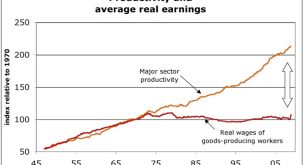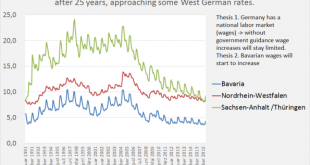download whole issue Preface download pdf Trumponomics: everything to fear including fear itself? 3Jamie Morgan download pdf Can Trump overcome secular stagnation? 20James K. Galbraith download pdf Trump through a Polanyi lens: considering community well-being 28Anne Mayhew download pdf ...
Read More »We’re #1!
from David Ruccio According to calculations by Kenneth Thomas (based on data in the latest Credit Suisse Global Wealth Report), the United States has the most unequal distribution of wealth of any rich nation. And it’s not even close! Thomas calculates the ratio of mean to median wealth for each country (the last column in the table above) to devise a measure of wealth inequality. As you can see, the U.S. inequality ratio is more than 50% higher than #2 Denmark and fully three times as...
Read More »Dean Baker Plunder and Blunder The Rise and Fall of the Bubble Economy
To be a good economist one cannot only be an economist
from Lars Syll [embedded content] The master-economist must possess a rare combination of gifts …. He must be mathematician, historian, statesman, philosopher—in some degree. He must understand symbols and speak in words. He must contemplate the particular, in terms of the general, and touch abstract and concrete in the same flight of thought. He must study the present in the light of the past for the purposes of the future. No part of man’s nature or his institutions must be entirely...
Read More »Graph of the day 3. Turkish and Kurdish fertility
I made this graph (in fact: map) because of remarks by Erdogan, the Turkish president, that Turkish women in Europe should get more children: 5 instead of 3: wasn’t the birth rate (total fertility rate) in Turkey already way below 3? Thanks to a recent press release of Turkstat I discovered that, surprisingly (at least to me), the birthrate in many western areas of Turkey , about 1,6 or even lower, is as low as in countries like Italy, Spain, Portugal, Greece etcetera. The entire...
Read More »Dual economies and the vanishing middle-class
from David Ruccio Both Peter Temin and I are concerned about the vanishing middle-class and the desperate plight of most American workers. We even use similar statistics, such as the growing gap between productivity and workers’ wages and the share of income captured by the top 1 percent. And, as it turns out, both of us have invoked Arthur Lewis’s “dual economy” model to make sense of that growing gap. However, we present very different interpretations of the Lewis model and how it...
Read More »Why Krugman and Stiglitz are no real alternatives to mainstream economics
from Lars Syll Little in the discipline has changed in the wake of the crisis. Mirowski thinks that this is at least in part a result of the impotence of the loyal opposition — those economists such as Joseph Stiglitz or Paul Krugman who attempt to oppose the more viciously neoliberal articulations of economic theory from within the camp of neoclassical economics. Though Krugman and Stiglitz have attacked concepts like the efficient markets hypothesis … Mirowski argues that their attempt...
Read More »Graph of the day 2. How to understand bilateral trade balances.
Today: 2 graphs. And do I really have to write this blog? Yes, I have. At this moment the USA government seems to target bilateral trade balances: these should be more or less balanced. To quote a Trumptweet (January 27, 2017): “The U.S. has a 60 billion dollar trade deficit with Mexico. It has been a one-sided deal from the beginning of NAFTA with massive numbers…”. But it does not work that way. Bilateral trade deficits are not the right measure to estimate if trade is one-sided...
Read More »Some graphs 1. German unemployment
The coming days I will post some graphs. The first I made to answer the question if East German unemployment was finally coming down. East Germany has experienced sky-high unemployment for decades despite massive transfers and despite a wage level which is supposed to be 25% lower than in West Germany. But at this moment, East German über-unemployment has more or less disappeared, at least compared with the German version of the rust belt (Stainless steel belt? Nutzeisen belt?). Two...
Read More »Neoliberalism and mainstream economics
from Lars Syll Oxford professor Simon Wren-Lewis isn’t pleased with heterodox attacks on mainstream economics. One of the reasons is that he doesn’t share the heterodox view that mainstream economics and neoliberal ideas are highly linked. In a post on his blog, Wren-Lewis defends the mainstream economics establishment against critique waged against it by Phil Mirowski: Mirowski overestimates the extent to which neoliberal ideas have become “embedded in economic theory”, and...
Read More » Real-World Economics Review
Real-World Economics Review








